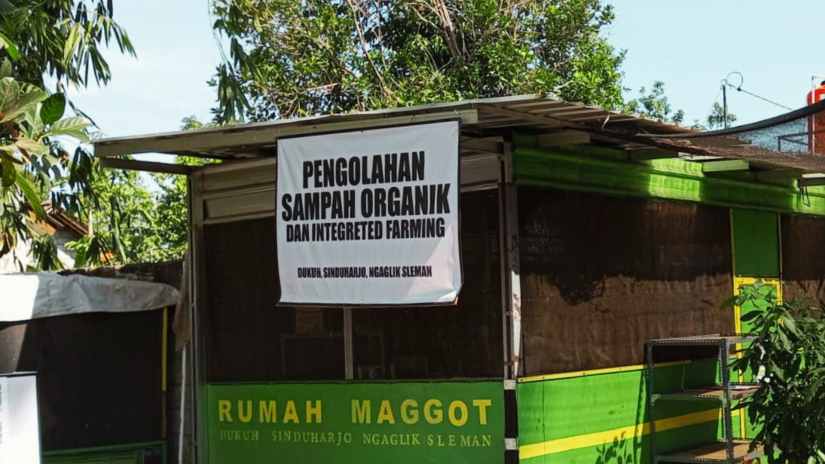
On September 10, 2023, the Doctoral Program in Environmental Science initiated the 2023 Community Service (PkM) activities in Dukuh, Sinduharjo, Ngaglik, Sleman. In collaboration with the Anom Sari Youth Organization, the Environmental Group, and the Migunani Waste Management Self-Help Group, the PkM program was carried out through three main activities: a Waste Management Workshop, a visit to Omah Maggot Jogja, and assistance in the production of compost and organic liquid fertilizer (NPK). As a result of these activities, the “Migunani Maggot House” was established and continues to operate.
(Activity Documentation)
“The Migunani Maggot House is a facility for processing organic waste using Black Soldier Fly (BSF) maggots,” explained Dian Hudawan S., a Doctoral student in Environmental Science and the Head of the Dukuh, Sinduharjo, Ngaglik Waste Management Group.
The Migunani Maggot House utilizes BSF maggots to reduce the volume of organic waste, decrease the burden on final disposal sites (TPA), and minimize greenhouse gas emissions from waste decomposition. This represents an environmentally friendly solution for handling organic waste, which is often neglected in conventional waste management efforts. Beyond waste reduction, BSF maggots also hold significant economic potential. Fully grown larvae can be processed into high-quality livestock feed. Consequently, this waste management practice generates a new source of income for the community, particularly for farmers and individuals involved in waste processing enterprises.
Dian Hudawan S. further explained, “BSF maggots are the larvae of Hermetia illucens, known for their efficiency in decomposing organic waste. Their life cycle begins with eggs that hatch into larvae, which represent the stage with the highest capacity for consuming organic waste. After several weeks, the larvae transform into pupae and eventually mature into adult flies. Although this may seem like a natural process, it offers a fast and efficient waste management solution. The larvae can consume up to five times their body weight in organic waste daily.”
Moreover, waste management using BSF maggots aligns closely with the Sustainable Development Goals (SDGs). This initiative supports key SDG targets, including climate action (SDG 13), responsible consumption and production (SDG 12), and poverty eradication (SDG 1), through the creation of new employment opportunities in the waste management and agricultural sectors.
(Migunani Maggot House Documentation)
A notable outcome of the PkM program, on September 9, 2024, the Migunani Organic Waste Management Group was selected as a representative sample in the LPMKal provincial-level competition for the Special Region of Yogyakarta, representing Sleman Regency. The competition emphasized innovation and sustainability. Waste processing using BSF maggots was recognized as highly innovative, offering a practical solution to waste management challenges in the region. Its sustainability is demonstrated by the promising economic value generated from BSF utilization, providing high potential for long-term impact by creating alternative employment opportunities for the community.
Author: Ulyn




